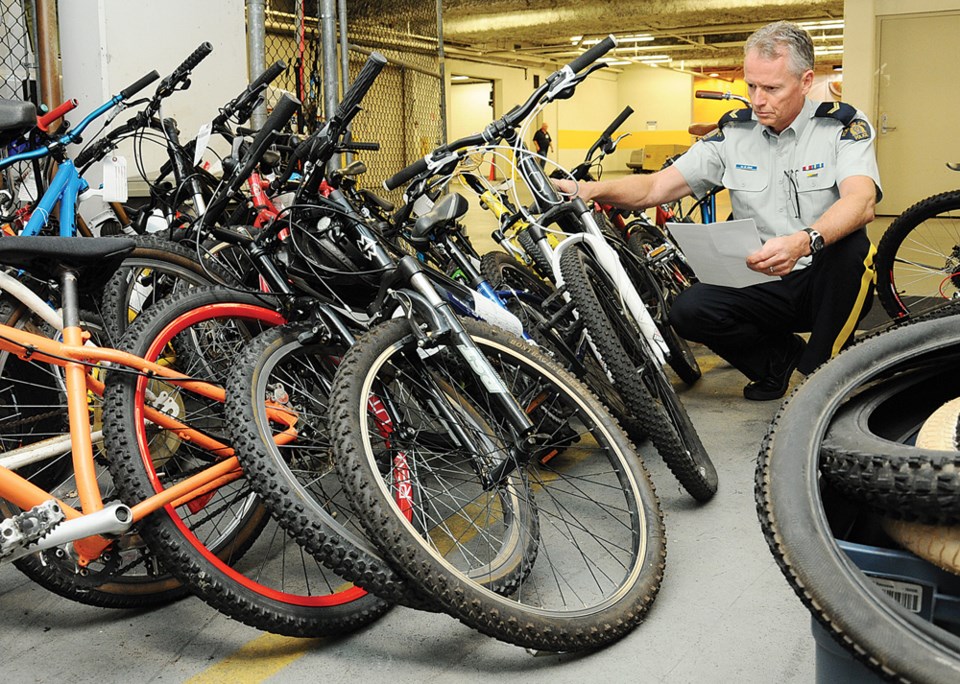Step one: Lock it up tight in Charlottetown, P.E.I.
Step two: Just kidding.
Every spring, the number of bikes reported stolen to North Vancouver RCMP begins to climb. In 2021, there were 262 stolen locally, 13 of which were valued at more than $5,000.
The department is hoping to keep more bikes with their rightful owners by offering some sound advice in advance.
Target hardening
Whether it’s at home or in public, the importance of quality locks cannot be overstated, yes, locks – plural.
The RCMP recommend using both a U-lock and a cable lock. The locks should go through the bike’s frame, never just the wheel, as wheels can be easily removed.
That also includes when your steed is loaded in your parked vehicle. Even secured underground parking lots are target-rich environments for bike thieves, police say. And high-end mountain bikes are often stolen from bike racks on cars or from the backs of pickup trucks while their owners are running even short errands, according to the RCMP.
When choosing where to lock up, well-lit areas with good visibility are always best.
As an extra deterrent, remove the seat or the front wheel.
Too late
When a bike is stolen, most often it is quickly resold on online marketplaces like Craigslist or Facebook. Other times, they’re sent to chop shops where they are disassembled and the parts swapped with components from other bikes, helping to obscure where the bike came from.
That’s partly why it’s so important to keep a record of a bike’s serial number, as well as photos of the bike, said Sgt. Peter DeVries, North Vancouver RCMP spokesman.
Most often, the serial number will be etched into the underside of the crank, but it may also be on the headset (where the handle bars attach to the frame), on the rear stays, on the seat down tube next to the crank, or on the top of the crank. People might even want to make their own engravings somewhere on the bike, DeVries added.
Owners should always , a free bicycle registration and recovery service.
Stolen goods
If you do spot your stolen bike online, it’s best to leave the recovery to the professionals, DeVries said.
“Get in touch with us,” he said. “It's better than the alternative. We don't want people going in and trying to get their bikes back. You just do not know who you're dealing with and they could be violent, they could be dangerous. We really don't recommend people doing it, as frustrating as it may be. Never put yourself in a situation where you could be hurt.”
People who have followed the above steps stand the best chance of getting their bikes back.
“It happens with quite a bit of regularity,” DeVries said.
Bait bikes
The RCMP have also been taking steps to disrupt bicycle thieves in action.
The force recently disclosed that they have been operating a bait bike program, allowing them to quickly arrest suspects helping themselves to bikes that are being closely watched by officers.
"It's partly to let people in North Van know that we hear their complaints, we know this is a problem, and we're working hard to tackle it," said DeVries. "And it's partly to send a message to any would-be bike thieves. If you come to North Van to steal a bike, you'll never know if it's one of ours until it's too late."
Exactly how many bait bikes there are and how many people have been busted trying to steal one is being kept under wraps, however.
“Let's just say our bait bikes are proving effective. They can be anywhere in North Van, we know the instant one is stolen, and we'll be waiting right around the corner,” DeVries said.
In order to deter theft, the RCMP will be posting signs throughout North Van warning would-be thieves that a bait bike program is very much in effect.



